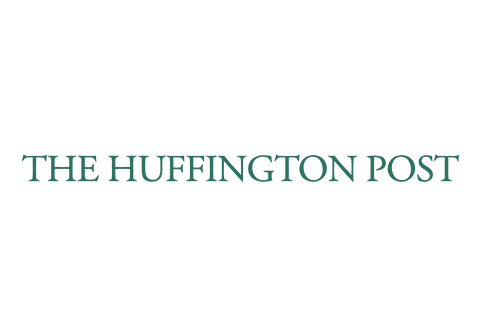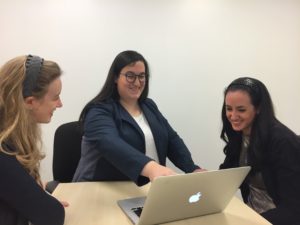
Meet the Leading Ladies of PR: Ariella Steinreich, Vice President of Steinreich Communications
The Huffington Post
By Yitzi Wiener
“A good PR professional must be flexible and able to pivot their angle to get maximum exposure for their client.”
I had the pleasure of interviewing Ariella Steinreich, Vice President of Steinreich Communications, one of the nation’s fastest growing, full-service public relations firms with offices in New York, Washington, Los Angeles, High Point, London, Frankfurt and Tel Aviv. Steinreich Communications represents some of the world’s leading corporations and consumer brands.
Yitzi: Can you share your “backstory” with us?
I joined Steinreich Communications three years ago after spending five years at major public relations firms where I created and implemented global corporate communications programs for leading companies and organizations, including: Accenture, U.S. Trust, Constellation Energy, Axioma, eVestment, Amadeus and The Said Business School at Oxford University. I absolutely love the world of PR and have known since I was a young child that I wanted to go into this industry. Every day is exciting – from the news of the day which drives our pitching, to our clients who are making an impact – whether in the corporate or non-profit space, to the journalists I work with who play a more critical role today than ever before.
Yitzi: How did you get involved in the PR industry?
I’ve known I wanted to go into PR since I was in first grade. I’m lucky to have my father, who is an industry veteran, mentor me and my passion for PR since I was a young child. In first grade I had the opportunity to go to work with my father for the day while he was at Edelman. While I was still young, I grasped that what he and his colleagues were doing was sharing their clients’ stories – I would later learn that it was thought leadership – with the media in order to make an impact.
After that day, I knew that I wanted to go into PR so while my classmates all had dreams of being doctors, lawyers etc., I knew that PR was where I wanted to end up. My father started his firm, Steinreich Communications, when I was in middle school and often would offer if I’d like to join him or a colleague for a client’s broadcast segment which I loved. It grew from there, he’d have me write press releases on household items that he would review. During my summer breaks in high school I would intern for him and work in different groups from corporate to consumer. I was very lucky to learn a lot of the basics growing up. I think that a lot of the experiential way in which he taught me about the business lead to flaming my passion for the work we do.
Yitzi: Can you share one of the most poignant stories that occurred to you in the course of your career?
We have been representing the Jewish Foundation for the Righteous for about 13 years. They annually reunite a non-Jewish rescuer who saved the life of a Holocaust survivor by hiding them during the war. The rescuer and survivor haven’t seen each other since the end of the war (60+ years ago). Each year as we gather in JFK airport in New York, the anticipation grows as we wait with the 30+ media outlets gathered to see this reunion. There is never a dry eye in the room when the rescuer and survivor enter the room and embrace and speak for the first time in over 60 years. I am so honored to help publicize such as important story and the JFR’s mission of supporting Righteous Gentiles who saved Jews during the Holocaust.
Yitzi: What are some of the most interesting or exciting projects you are working on now?
All of my clients have interesting things going on! For example, one of our university clients is rethinking the way liberal arts education is taught. One of my clients in the social action space is working to bring together different ethnicities which is inspiring. One of my clients in the supply chain space, is using 3D printing to manufacture their products in a shorter time.
Yitzi: What are you most proud of?
I’m most proud of our team and their desire and dedication to deliver tangible results to our clients every day. We create an environment where our team members have the space to be entrepreneurial and explore new opportunities and passions within the public relations field. Our senior staff is dedicated to teaching the art of media relations to our more junior level team members.
Yitzi: Do you think the PR profession has changed over the past 5 years? How?
I think the biggest change is that as technology permeates every sector of business, it brings with it the advent of a data-driven society. Business leaders are used to receiving metrics each day about how their product is doing in the marketplace and in the consultancy business, they look at how efficient and productive their team is. As a result, business leaders look at each decision they make through the lens of what the ROI will be. In the public relations business, our clients are no different because their first question is “how will I know if this PR campaign is impacting my business?” The biggest change is our ability to track results from media placements. Whether engagement on social media or click-throughs on URLs in media coverage, it is so easy to track our great work.
Yitzi: What drives you?
My clients and the work they are doing, my team and training the next generation of PR practitioners. I’m very lucky to work with clients who are making an impact every day in their respective fields. It’s exciting to learn their latest initiatives and to craft the messages and story for the media. I’m lucky to work with colleagues who share the same vision as me. We have wonderful practitioners in the firm but I’m particularly proud of my immediate team. Every day they come in with new ideas and their passion for our clients and the work we do inspires me daily. One of my favorite aspects of my role at Steinreich Communications is that I get to participate in much of the training process for our junior colleagues. Whether it is someone informally popping by my office to ask a question or leading a session on the changing media landscape, it is always exciting and a privilege to help in training them.
Yitzi: Based on your personal experience, what advice would you give to young people considering a career in PR?
Choose an internship or job where you will work for and with an amazing mentor. Throughout my career, I’ve always chosen roles where I would have the opportunity to learn from amazing mentors – it’s not just about the PR skills you will learn but also the mentorship and leadership skills that you will learn from those people. I have made this the priority in every career move I’ve made and I couldn’t be happier or more appreciative for everything I’ve learned. It’s because of the people I’ve worked with throughout my career that I’ve always gone to work excited each and every morning. The people you learn from and work with will define the type of practitioner you become.
Yitzi: You are known as a master networker. Can you share some tips on great networking?
Networking is one of the most important skills someone in PR can have. It plays a role in everything from recruiting talent, to cultivating new client relationships and wonderful working relationships with the media.
LinkedIn is a wonderful tool if you use it the right way. It provides the opportunity to learn what your colleagues (past and present) are up to. Every time I get a resume to review or a company reaches out about potentially retaining our services, the first thing I do is check LinkedIn to see if I know anyone in common with that person or company.
Unfortunately, networking events get a lot of flak, however, I’ve found that if you go to events targeted to our profession specifically, they can be very fruitful. For example, one of my favorite networking events is put on by one of our media database vendors. They bring together a panel of journalists who discuss what they are looking for from PR people. I always make sure to walk up to the journalists and introduce myself and more times than not, it ends up in our discussing meeting up for coffee or speaking via phone about my clients and how they can serve as resources to the journalist. These events also provide the opportunity for me to meet up with past colleagues who introduce me to their current colleagues. Sometimes this leads to recruiting new talent. These events are a win all around.
Yitzi: Which skills do you think are most important to becoming a successful PR professional?
- Listening – While we hired by our clients to counsel them on the best way to get their message out to the media, it is important to really listen to them and what their goals are.
- Flexibility – The PR business is very similar to the news business – we often wake up thinking that the day will go one way and in the end, it is very different because of breaking news (either from the client or the media looking for commentary). A good PR professional must be flexible and able to pivot their angle to get maximum exposure for their client.
- Curiosity – A successful PR practitioner must be curious about the world around them and look at stories in the media and life experiences as opportunities to expand their universe. We bring that back with us into the work we do and it leads to a constant stream of creativity.
- Entrepreneurialism – The PR business is never stagnant and nor should the people who practice public relations. To be a successful practitioner, you must have passion, self-motivation and a constant desire to learn new things and read the media – all types from print to online and for broadcast – from TV to radio.
- Creativity – The media landscape is constantly changing, however, from my experience, the biggest shift has been in the last year. Since the election, the media has put more resources behind its political coverage, in fact, many times we pitch a journalist on a different beat and they’ll say that the story is interesting but they’ve just been asked to serve as an extra resource for a political story their publication is working on. It puts the pressure on PR practitioners to be more creative in their pitch in order to secure interest from journalists.
Yitzi: You are in a position of influence. How have you used your position and skill to bring goodness to the world?
This is a great question. First, I remind myself on a constant basis about how lucky I am to be in the position that I am in and what a privilege it is. I’ve been blessed to take on “passion projects” which combine my desire to give back to both my immediate community and the broader global community around me. I’ll give you two recent examples. In September, both Houston and Florida got hit hard by hurricanes. Sitting here in New York City, I kept thinking what could I do to help. One of the media outlets we work closely, reached out to us to share that they were planning a trip to Houston to report on the conditions after the hurricane there and to raise money through their coverage for local charities trying to rebuild the city. They approached us and asked if we’d partner with them to raise awareness of this. I replied immediately that we’d love to partner with them to help raise awareness. Just one week later, South Florida braced for Hurricane Irma and the media did a wonderful job at alerting the public about the danger the Hurricane posed.
A friend of mine who lives in Atlanta reached out to me to tell me that he and a group from the two local Synagogues created a Google doc which was shared with the South Florida Jewish community for those who would like to be hosted by the Atlanta Jewish community for the Sabbath and until they could return to their homes. He asked me if I’d be interested in helping them raise awareness – their intentions were to raise awareness in Atlanta in order to get more families to sign up to host these Floridians and then to also raise awareness in the South Florida Jewish community that the Atlanta community was interested in hosting them. I immediately said that I and our firm would help. We raised awareness of what they were doing and got all of their local media to cover the amazing hospitality they provided and as a result of the media stories about this, more Floridians learned about this hospitality that was being offered to them and they participated. I am humbled in my and our firm’s involvement in both of these recent examples. I recognize the privilege that I have that I can make these types of decisions about taking on work that truly betters the world around us.
Yitzi: Who are some of the most high-profile clients you have helped?
Throughout my career I’ve been lucky to work with some of the top companies in the corporate/finance sector. However, in the last couple of years, I’ve started to also focus on my passion of non-profits. There, I’ve had the opportunity to work with a few celebrities who are involved in these organizations.
Yitzi: What was that like?
The celebrities I’ve worked with are very similar to other clients – they are passionate about the work the organization does, they are driven to make an impact on the world around them through the work their organization does. And, just like every other CEO, they are pressed for time so it is all about bringing them the media opportunities that will change the narrative around an issue and deliver an ROI to their organization.
Yitzi: Which people in history inspire you the most? Why?
Steve Jobs inspires me because he created a company that consistently drives the consumer marketplace. He had a vision and stuck to his core messaging and product and didn’t veer from it.
Harold Burson inspires me because he really created the industry that we’re in. I’ve had the privilege of meeting him in person and speaking with him while I was at Burson-Marsteller and his stories and experience drive me and I’d think any PR professional to master their craft.
Yitzi: Which company do you admire most, and why?
I most admire Apple. They’ve stayed true to their core messages throughout the history of their company.
Yitzi: What are your “5 Things I Wish Someone Told Me Before I Started” and why?
- Tenacity is key – Not all of your pitches work out but being tenacious is the key to success. Push yourself to find another angle to pitch a journalist. If you’re determined, you’ll find a way!
- Analytics are crucial – All clients want to know how your PR program will deliver ROI to them – whether in the form of sales, donations etc. Tracking results from media placements allows you to answer that question.
- There is no such thing as just being a “traditional media” person or a “social media” person – all media is intertwined! PR people can’t exist in silos. I used to think of myself as a “traditional media” person and yes, I did extend that to digital media outlets like Quartz, Huffington Post etc. but I’ve since learned that in order to be a successful PR practitioner, I also need to understand social media and how the two work together to promote each other.
- Blurring the lines … traditional media moving into the digital space – Traditional publications have realized that they need to become more digital and offer multiple platforms in order to compete for readers in today’s highly saturated media environment. It’s no longer about having your website be easily accessible from a mobile device; now it’s about creating full mobile platforms, including more video with reporting and leveraging social media channels. A great example of a traditional media outlet that has successfully moved to the digital media space would be The Wall Street Journal. The Journal streams live TV each day, has a terrific mobile platform and their journalists are quite active on social media.
- Our industry is as much about education as it is about the media placements – Public relations is constantly evolving. New media enter the market, new social media platforms develop etc. As PR practitioners, we need to be able to educate and articulate the business case for pitching an idea or new media publication to our clients to get their buy-in.



